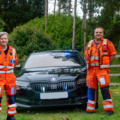About Us
Despite common misconception, pre-hospital critical care is not funded by the NHS. Road ambulances cannot administer some medications, give emergency general anaesthetics or perform surgery in the community. Local air ambulance charities - who also provide critical care - do not always operate 24 hours a day including at night. So what happens when somebody is seriously ill in our local area but other services cannot help? The NHS calls upon our charity, Bravo Medics.
Bravo (BRistol and Avon VOlunteer) Medics launched in early 2020 in response to increasing demand for pre-hospital critical care. We are a Bristol-based charity run by two volunteer responders who directly save lives across Avon (Bristol, Bath and parts of Gloucestershire, Somerset and Wiltshire however we are also called to Devon and South Wales if needed).
We are an independent charity accredited by the British Association for Immediate Care. We are independent of the NHS and statutory services but work with them to ensure we reach people and save lives when others can’t.
Our dedicated volunteers James and Andrew, are highly trained critical care doctors who are on call to drive on blue lights to emergencies at any time. They provide hospital-level care in the community, which would otherwise be unavailable. Two new volunteer responders will join the team in 2022.
Why is a critical care charity required?
• Waiting until people arrive at hospital to get the treatment they need can have a serious effect on their survival and recovery. Despite this, pre-hospital critical care is not funded by the NHS.
• Our local air ambulances do not work 24 hours a day and in many cases cannot fly during the hours of darkness; this leaves key periods of the night with no critical care service available.
• Some interventions are only available within hospital or through Bravo Medics. NHS paramedics are highly trained to provide treatment, discharge people on scene or transfer them to hospital, but they are unable to carry out some specialist procedures such as administering an emergency general anaesthetic.
• Ambulances cannot carry some medications including those used for seizures, eclampsia (a condition in late pregnancy), asthma, severe sepsis, life threatening electrical activity in the heart or cardiac arrest.
• The Ambulance Service is stretched and without Bravo Medics, people may not be reached in time. The target for ambulances to reach immediately life-threatening emergencies (Category 1 calls) within eight minutes, has not been achieved since 2014. Despite COVID-19 rates falling, in July 2021 the average Category 1 response time for England was the longest since 2018.
• As of July this year, we have seen a 15% average monthly increase in call-outs versus last year. The rise in ‘staycations’ and visits to the South West has led to a 21% increase in 999 ambulance calls per day. In-turn, the Ambulance Service has declared a critical incident. With more vehicles on the road, traffic collisions are increasing (by 12% since 2016 (Department for Transport)).
• More than 30,000 out of hospital cardiac arrests occur every year in the UK but only 1 in 10 people survive. Each doctor attends around 26 cardiac arrests a year. We expect to experience a rise in cardiac arrest incidents year on year, so we need to not only be available, but have the equipment needed to deal with cardiac arrests more effectively.
A typical response
1. Call handlers at the South Western Ambulance Service assess the situation including the patient, location and how serious it is. If the situation is a life threatening trauma or medical emergency to which other services cannot assist, they dispatch us via pager or mobile phone. Our volunteers then drop whatever they are doing, rush to their cars and assist.
2. Andrew and James can drive on ‘blue lights’. They are fully trained to respond in this way and their cars have been fitted with the relevant equipment.
3. Once we arrive, we provide hospital level intensive care, improving people’s chance of survival and reducing any ongoing disability they might suffer. Treatments can include:
- Emergency anaesthesia.
- Surgery such as open heart and tracheostomy-type incisions.
- Sedation and advanced pain relief including regional ultrasound blocks.
- Medications only available in hospital.
- Consultant level decision making.
4. We then transport patients to the most appropriate hospital whilst their treatment continues.
5. Once we have transferred the people to hospital our support doesn’t end. We go a step further by giving people a card which enables them to contact our responders so we can explain what happened and what care was provided which can aid recovery.
Press releases
Local emergency medical charity given a life-saving start to the New Year
Two volunteer doctors secured by Bravo Medics to deliver life-saving treatment and support an overstretched NHS Bravo Medics today announced... read more
10.01.2022 • By Bravo Medics

